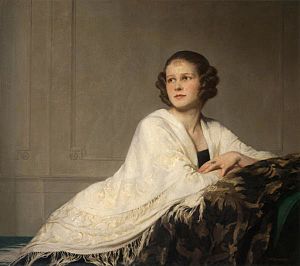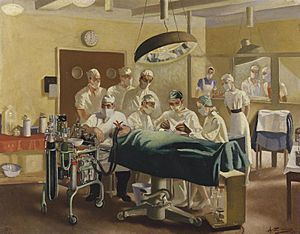Anna Zinkeisen facts for kids
Quick facts for kids
Anna Zinkeisen
|
|
|---|---|
 |
|
| Born | 29 August 1901 Kilcreggan, Scotland
|
| Died | 23 September 1976 (aged 75) London, England
|
| Education |
|
| Known for | Painting |
| Spouse(s) | Guy Heseltine |
Anna Katrina Zinkeisen (born August 29, 1901 – died September 23, 1976) was a talented Scottish painter and artist. She was known for her portraits, murals, and her important work during World War II.
Biography
Anna Zinkeisen was born in Kilcreggan, Scotland, in 1901. Her father, Victor Zinkeisen, was a timber merchant. In 1909, her family moved to Middlesex, England.
Anna and her sister, Doris, were first taught at home. Later, they both went to the Harrow School of Art. They even won scholarships to the Royal Academy Schools, a famous art school. Anna studied sculpture there from 1916 to 1921. She won silver and bronze medals for her work. In 1919, her art was shown at the Royal Academy for the first time.
She also created designs for the Wedgwood company. These designs won a silver medal in Paris in 1925. However, Anna decided to focus on painting portraits and large wall paintings called murals.
Art on Ocean Liners
In 1935, Anna and Doris Zinkeisen received a special job. The Clydebank shipbuilders, John Brown and Company, asked them to paint murals for the ocean liner RMS Queen Mary. You can still see their beautiful artwork in the Verandah Grill room on the ship. Today, the Queen Mary is a hotel and museum in Long Beach, California.
Around this time, Anna also drew pictures for books and magazine covers. She designed posters too, like "Merry-go-round" for London Transport. In 1940, both sisters also painted murals for another famous ship, the RMS Queen Elizabeth.
War Work
During World War II, Anna Zinkeisen helped as a Medical Artist and a nursing assistant. She worked at St. Mary's Hospital in Paddington, London. After her shifts as a nurse, she would use an empty operating room as her art studio.
She painted scenes from the hospital and showed what air-raid victims looked like. She also made detailed drawings of war injuries for the Royal College of Surgeons. Her self-portrait and her painting of the plastic surgeon Sir Archibald McIndoe are displayed at the National Portrait Gallery in London.
After the war, Anna painted portraits of many important people. These included Prince Philip, Sir Alexander Fleming (who discovered penicillin), and Lord Beaverbrook.
Towards the end of the war, London Underground asked Anna to create a poster. It showed a woman leading a family away from the war towards sunny fields. The poster included a quote from Winston Churchill.
Later Works
In 1944, Anna and Doris Zinkeisen were asked by United Steel Companies (USC) to create twelve paintings. These pictures were used in magazines and newspapers in Britain, Canada, Australia, and South Africa. The paintings were later put together in a book called This Present Age in 1946.
Anna's artwork was also part of the painting event at the 1948 Summer Olympics art competition.
Around 1967, Anna Zinkeisen painted a mural in memory of her husband, Col. Guy Heseltine. This mural, showing birds from the Bible, can be seen in St Botolph's church in Burgh, Suffolk.
See also
 In Spanish: Anna Zinkeisen para niños
In Spanish: Anna Zinkeisen para niños


